Epoxy flooring is a popular choice for both residential and commercial spaces due to its durability, versatility, and easy maintenance.
We will explore the benefits of epoxy flooring, factors that determine the cost, average pricing for residential and commercial projects, and what factors can affect the overall cost.
Find out if epoxy flooring is worth the investment and how to get an accurate estimate for your project.
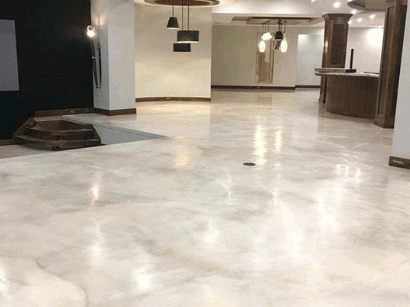
Epoxy flooring is a type of resin flooring system that is created by mixing a two-part resin and hardener to form a durable and seamless surface. It is commonly used in industrial settings and by homeowners looking for a strong and long-lasting flooring solution.
Epoxy flooring offers a wide range of benefits that make it stand out among traditional flooring options. Its versatility allows it to be applied in various environments, ranging from commercial warehouses to residential garages. With specific types like PMMA and Polyurethane, epoxy materials can be tailored to enhance properties such as chemical resistance, impact strength, and UV stability.
Explore: What Is The Best Epoxy Floor Coating For Garage
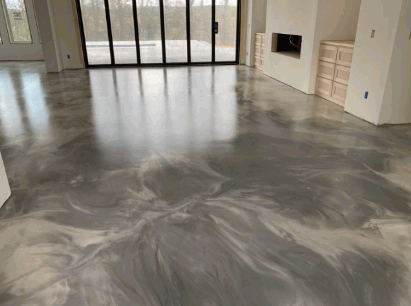
Epoxy flooring offers several benefits that make it a popular choice for flooring solutions. These benefits include exceptional durability, versatile application options, easy maintenance, and high resistance to chemicals and stains.
One of the key advantages of epoxy flooring is its remarkable durability, making it an ideal solution for high-traffic areas like warehouses, industrial facilities, and commercial spaces. The robust nature of epoxy coatings ensures that the floor can withstand heavy foot traffic, machinery, and equipment without showing signs of wear and tear.
Epoxy flooring provides a versatile platform for customisation, allowing for the creation of unique designs, patterns, and colours. This versatility makes it a popular choice for decorative purposes in various settings, from retail stores to residential garages.
In terms of maintenance, epoxy flooring stands out for its ease of care. With minimal upkeep requirements, such as regular sweeping and occasional mopping, maintaining the pristine appearance of epoxy floors is hassle-free.
Epoxy flooring's ability to resist chemicals and spills is another notable benefit. This feature is particularly advantageous in environments where exposure to corrosive substances or frequent spills is common, such as laboratories, automotive workshops, and manufacturing plants. Specific types of epoxy, such as PMMA and Polyurethane coatings, offer enhanced chemical resistance, further reinforcing the protective qualities of epoxy flooring.
Durability is one of the key advantages of resin flooring systems like epoxy, PMMA, and Polyurethane. These floors are known for their toughness and ability to withstand heavy foot traffic and wear over time.
Resin flooring systems are highly sought after for their unmatched durability in both industrial and residential settings. Epoxy floors, for instance, are renowned for their exceptional resilience to chemicals, impact, and abrasion, making them ideal for high-traffic areas like warehouses and garages.
Similarly, PMMA floors are favoured for their rapid curing time and resistance to UV radiation, making them perfect for outdoor applications. On the other hand, Polyurethane floors, with their flexible yet sturdy nature, are a popular choice for areas prone to thermal shock.
Resin flooring, including epoxy, offers a high level of versatility in terms of design and application. Its flexibility allows for various aesthetic options, making it suitable for different interior styles and preferences.
Epoxy and other resin flooring types are not only durable but also incredibly customisable, offering a wide range of colours, patterns, and finishes to suit any design vision. Whether you prefer a sleek, modern look or a more rustic feel, resin floors can be tailored to match your individual style.
These flooring options are popular choices in residential spaces like kitchens, bathrooms, and living rooms, as well as in commercial settings such as retail stores, restaurants, and offices. In modern architecture, epoxy and resin floors are increasingly used for their seamless appearance and ability to create a cohesive aesthetic.
One of the standout features of resin flooring, such as epoxy, is its easy maintenance requirements. Regular cleaning with a suitable cleaning solution helps keep the floor in top condition with minimal effort.
Unlike some other types of flooring that require intensive maintenance routines, resin floors are quite forgiving when it comes to cleaning. A gentle sweep or vacuum to remove dust and debris followed by a mop with a mild detergent solution is usually all that's needed to keep the floor looking pristine.
For tougher stains or spills, a mixture of warm water and a pH-neutral cleaner can be used. Avoid abrasive cleaners that can damage the resin surface.
Resin flooring systems like epoxy are known for their exceptional chemical resistance, making them a safe and hygienic choice for environments where exposure to chemicals is a concern.
This high level of chemical resistance in resin flooring systems plays a crucial role in ensuring the safety of individuals working or residing in such spaces. Epoxy, PMMA, and Polyurethane floors are designed to withstand a wide range of chemicals, including acids, alkalis, solvents, and oils, making them ideal for industrial facilities, laboratories, hospitals, and even residential garages.
The cost of epoxy flooring is influenced by various factors such as the type of epoxy used, the square footage of the area to be covered, the extent of preparation work required, and the labour costs associated with installation.
In terms of epoxy type choice, the selection between different varieties like PMMA and Polyurethane can significantly impact pricing. PMMA, known for its rapid curing time and high chemical resistance, tends to be on the higher end of the cost spectrum, while Polyurethane, offering excellent UV resistance, may be more budget-friendly.
Area size plays a crucial role in determining the overall expense. Larger spaces require more epoxy material, resulting in higher costs, whereas smaller areas can be coated more economically.
Necessary preparation work is another vital cost factor. Extensive surface preparation, such as concrete grinding or repairs, can add to the total project cost. The condition of the substrate directly influences the amount of preparation needed.
Lastly, labour expenses contribute significantly to the total expenditure. Skilled labour with experience in epoxy flooring applications may charge higher rates but ensures a quality installation that can impact the longevity and performance of the floor.
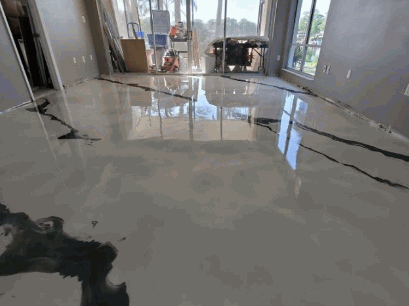
The type of epoxy selected for flooring installations plays a significant role in determining the overall cost. Different epoxy options such as PMMA and Polyurethane come with varying price points and performance characteristics.
For instance, PMMA, also known as acrylic resin, is renowned for its rapid curing time, making it ideal for projects with tight deadlines where time is of the essence.
On the other hand, Polyurethane is valued for its exceptional durability and resistance to chemicals, making it suitable for areas exposed to harsh substances or heavy foot traffic.
When considering installation costs, PMMA may offer a cost-effective solution for quick turnarounds due to its fast application and curing process, saving labour expenses and minimising downtime. Alternatively, Polyurethane's long-lasting properties can be more beneficial in high-traffic environments over time, reducing the need for frequent repairs or replacements.
The total square footage of the area to be covered with epoxy flooring directly affects the overall cost. Larger spaces require more materials and labor, potentially increasing the installation expenses.
The design finish complexity plays a crucial role in determining the pricing for different coverage areas. Elaborate patterns or intricate textures may require additional labor hours and specialised techniques, driving up the overall costs. When dealing with irregularly shaped spaces or areas with obstacles that need extra attention during installation, the pricing can also vary. It's essential to consider both the size of the area and the intricacy of the design when calculating the total cost of your epoxy flooring project.
The extent of preparation work needed before epoxy flooring installation can significantly impact the overall cost. Smooth and well-prepared floor substrates require less effort and materials, leading to potential cost savings.
Properly preparing the floor substrate ensures a strong bond between the epoxy and the surface, increasing the longevity of the flooring. This is crucial in areas with high foot traffic or heavy equipment use, where durability is key. Thorough preparation can prevent issues like bubbling, peeling, or delamination, saving you from costly repairs in the future. Some common preparation tasks include concrete grinding to create a rough surface for better adhesion, repairing cracks and imperfections, and ensuring the surface is clean and free from contaminants like oils or solvents.
Labour costs for epoxy flooring projects vary based on the expertise and experience of the resin flooring contractor hired. Skilled professionals may command higher rates but deliver superior quality workmanship.
In terms of epoxy flooring installations, labour costs play a significant role in shaping the overall expenses. Hiring a reputable contractor with proper training and skills can lead to smoother project execution and long-lasting results. By investing in experienced professionals, property owners can ensure that the installation is done correctly the first time, reducing the risk of errors or redoing work. This can ultimately save time and money in the long run, outweighing the initial higher labour expenses. Skilled contractors can also provide valuable insights and recommendations on materials and techniques, resulting in a higher-quality finish.
The average cost of epoxy flooring can vary depending on the type of system used, with residential epoxy flooring generally priced differently from commercial epoxy flooring solutions.
For residential applications, the cost of epoxy flooring typically ranges from £2 to £10 per square foot. This price usually includes surface preparation, primer application, epoxy coating, and sealant. On the other hand, commercial epoxy flooring tends to be more expensive due to higher-quality materials and additional layers needed for increased durability and resistance to heavy traffic. Commercial epoxy flooring can range from £6 to £20 per square foot, depending on the complexity and requirements of the project.
Residential epoxy flooring projects typically have lower overall costs compared to commercial installations. The pricing for residential epoxy floors is influenced by factors such as material quality, design complexity, and labour expenses.
When considering the cost implications of residential epoxy flooring, it's essential to delve into the specifics of how material choices, design preferences, and labour costs impact the overall pricing.
For instance, opting for a high-quality epoxy resin can increase the initial material cost but may result in enhanced durability and longevity, ultimately offering better value for money. Similarly, intricate design patterns or customised colour schemes can add to the overall project cost, reflecting the level of personalisation involved. Labour costs, including preparation, installation, and finishing, also play a significant role in determining the final expenses of a residential epoxy flooring project.
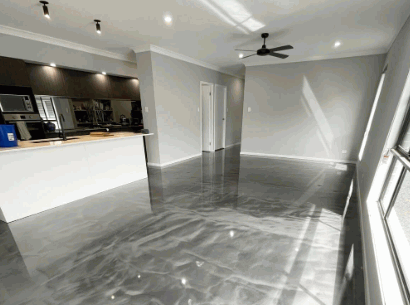
Commercial epoxy flooring solutions tend to be priced higher than residential options due to the larger surface areas involved, higher material requirements, and often more complex design specifications demanded by commercial clients.
In commercial settings, there are often specific requirements such as heavy-duty durability, chemical resistance, and ease of maintenance that drive up the costs. The preparation work for commercial spaces can also be more intensive, involving the need for concrete repairs, moisture barriers, or other specialised treatments that add to the overall expense. Quality is another key factor influencing pricing, as commercial clients typically expect a higher level of durability and performance from their epoxy flooring solutions. Meeting these stringent standards often requires specialised materials and installation techniques, further contributing to the higher cost of commercial projects.
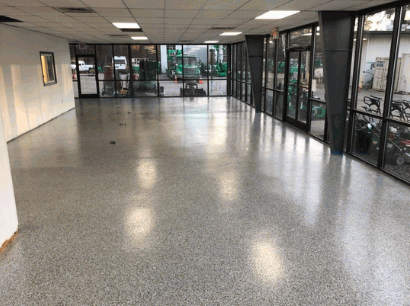
Several key factors can influence the cost of epoxy flooring installations, ranging from additional features and customisations to location-specific pricing variations. Understanding these factors is essential for accurate cost estimations.
One crucial element that impacts epoxy flooring costs significantly is the level of customisation desired. Customisable options such as colour choices, patterns, and logos can add complexity to the installation process, thereby increasing the overall expense.
The geographical location where the epoxy flooring is being installed plays a vital role in pricing. Regional variations in material costs, labour rates, and demand for specialised services can all influence the total cost of the project.
Another factor to consider is the experience and expertise of the contractor handling the installation. Experienced contractors may charge higher rates due to their proficiency and skill level, which can impact the final price of the epoxy flooring project.
Incorporating additional features or customisation elements into epoxy flooring projects can add to the overall cost. Features like decorative patterns, logos, or unique colour schemes require extra materials and labour, impacting the final price.
One of the most significant factors that contribute to the increase in project costs is the inclusion of special features such as metallic pigments, which create a stunning reflective effect but are more expensive than standard epoxy materials. Custom designs and intricate detailing like flecks, swirls, or marbling techniques also elevate the aesthetic appeal but necessitate skilled craftsmen and specialised techniques, which come at a premium.
Customising epoxy flooring designs to match specific aesthetic preferences or branding requirements can elevate the overall cost of the project. Tailored designs, intricate patterns, and unique finishes often require specialised materials and expert labour, impacting pricing.
For instance, incorporating a metallic epoxy finish to achieve a luxurious, reflective look can significantly increase the project's expenses. Similarly, opting for custom colour blends or incorporating logos and intricate designs into the flooring surface involves additional labour and material costs. These personalised touches not only enhance the visual appeal of the space but also add a unique touch that sets the floor apart from standard installations.
The geographical location where epoxy flooring is to be installed can affect pricing due to regional variations in material costs, labour rates, and accessibility factors. Urban areas may have higher installation expenses compared to rural locations.
Material costs can differ significantly based on the availability of suppliers and demand in a particular region. Labour rates tend to be influenced by the cost of living in the area, impacting the overall budget for the project. Logistical challenges such as transportation costs and ease of access to the installation site can also play a role in determining the final cost. It's important to consider these factors when planning an epoxy flooring project to ensure budget accuracy and project efficiency.
The level of experience and expertise of the resin flooring contractor hired for the project can impact the overall cost. Highly skilled contractors may command higher fees, but their quality workmanship and efficient installations can justify the expense.
Seasoned resin flooring contractors bring a wealth of knowledge and practical skills to the table, enabling them to tackle complex projects with ease and precision. Their experience also allows them to foresee potential issues and address them proactively, reducing the likelihood of costly delays and errors.
Whilst opting for more affordable contractors may seem like a budget-friendly choice initially, the long-term benefits of investing in experienced professionals far outweigh the immediate cost savings. Quality craftsmanship and durable results are key advantages of hiring reputable contractors, ensuring a visually appealing and lasting resin flooring solution.
Determining whether epoxy flooring is worth the cost involves weighing the benefits of durability, aesthetics, and maintenance against the initial investment. For many homeowners and businesses, the long-term advantages of epoxy floors justify the upfront expenses.
Epoxy flooring stands out as a cost-effective solution in various settings. In high-traffic areas such as industrial facilities, garages, or commercial spaces, the durability of epoxy floors is unmatched, ensuring a long-lasting surface that can withstand heavy use without showing signs of wear and tear. The aesthetic appeal of epoxy coatings also adds value by providing a sleek, seamless finish that is both visually appealing and easy to clean.
The low maintenance requirements of epoxy flooring contribute to its cost-effectiveness. With minimal effort, epoxy floors can be kept looking pristine, reducing the need for frequent repairs or replacements. This translates to savings in the long run, making it a wise investment for those seeking a durable and visually appealing flooring solution.
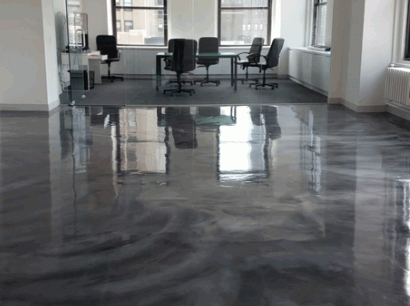
Obtaining an accurate estimate for epoxy flooring requires a detailed assessment of material costs, labour expenses, and any additional features or customisations desired. Consulting with reputable resin flooring contractors and obtaining multiple quotes can help in determining a precise budget.
When evaluating material costs for epoxy flooring, it is essential to consider the quality and quantity needed for the project. Opting for high-quality resin products may incur higher initial expenses but can result in a more durable and visually appealing finish.
Labour charges play a significant role in the overall cost, so it is advisable to gather detailed quotes from experienced professionals to compare prices and services offered. Discussing customisation options with contractors ensures that the project aligns with your specific requirements, preventing unexpected expenses later on.